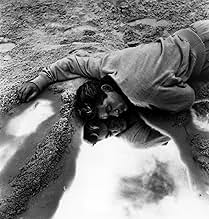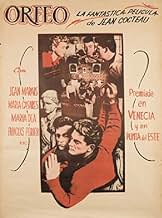IMDb-BEWERTUNG
7,8/10
13.796
IHRE BEWERTUNG
Ein in den Tod verliebter Dichter folgt seiner unglücklichen Frau in die Unterwelt.Ein in den Tod verliebter Dichter folgt seiner unglücklichen Frau in die Unterwelt.Ein in den Tod verliebter Dichter folgt seiner unglücklichen Frau in die Unterwelt.
- Nominiert für 1 BAFTA Award
- 2 Nominierungen insgesamt
André Carnège
- Judge
- (as Maurice Carnège)
Paul Amiot
- Judge
- (Nicht genannt)
Philippe Bordier
- Young Man at Café des Poètes
- (Nicht genannt)
Claude Borelli
- Une bacchante
- (Nicht genannt)
Jean-Louis Brau
- Un jeune homme à la terrasse du flore
- (Nicht genannt)
Jean Cocteau
- Narrator
- (Synchronisation)
- (Nicht genannt)
Handlung
WUSSTEST DU SCHON:
- WissenswertesThe opening scenes set in the Cafe des Poetes were originally set to be filmed with regular extras. However, Cocteau found them to be too self-conscious and artificial so they were all dismissed. Instead, real bohemians from Paris' real café culture were drafted in. These proved to be so natural and relaxed with the café setting, they actually stayed on for two extra days after filming had finished, just hanging out in the cafés that the film crew had been using.
- PatzerWhen Orphée is shot, the gun falls near his right foot. However when Heurtebise picks up the gun; the orientation changes and it is now near his right hand.
- Zitate
Heurtebise: I am letting you into the secret of all secrets, mirrors are gates through which death comes and goes. Moreover if you see your whole life in a mirror you will see death at work as you see bees behind the glass in a hive.
- VerbindungenEdited into Geschichte(n) des Kinos: Une histoire seule (1989)
- SoundtracksDance of the Blessed Souls -- from Orphée et Eurydice
Written by Christoph Willibald Gluck
Ausgewählte Rezension
This film is an updating of the Greek myth of Orpheus and Eurydice. The film updates the action to post-war France, with Orpheus (played by Jean Marais) a famous but dis-satisfied poet.
The film focuses on the themes of love and death. Most notably Orpheus falling in love with a glamorous incarnation of Death (Maria Casares).
Writer-director Jean Cocteau turns the everyday world into a magical realm. Mirrors turn to pools which are portals to other worlds, car radios pick up coded messages from Death's World. In less talented hands than Cocteau's, the delicate fantasy could have easily become ridiculous but he handles it with brilliance and the film works perfectly.
Here Cocteau creates a truly poetic film. The story is magical and entertaining and the film is filled with wonderously surreal images (particularly striking is the frequent use of filming an action performed backwards, and then reversing it which creates a very strange impression).
The film focuses on the themes of love and death. Most notably Orpheus falling in love with a glamorous incarnation of Death (Maria Casares).
Writer-director Jean Cocteau turns the everyday world into a magical realm. Mirrors turn to pools which are portals to other worlds, car radios pick up coded messages from Death's World. In less talented hands than Cocteau's, the delicate fantasy could have easily become ridiculous but he handles it with brilliance and the film works perfectly.
Here Cocteau creates a truly poetic film. The story is magical and entertaining and the film is filled with wonderously surreal images (particularly striking is the frequent use of filming an action performed backwards, and then reversing it which creates a very strange impression).
Top-Auswahl
Melde dich zum Bewerten an und greife auf die Watchlist für personalisierte Empfehlungen zu.
- How long is Orpheus?Powered by Alexa
Details
- Laufzeit1 Stunde 52 Minuten
- Farbe
- Seitenverhältnis
- 1.37 : 1
Zu dieser Seite beitragen
Bearbeitung vorschlagen oder fehlenden Inhalt hinzufügen

































